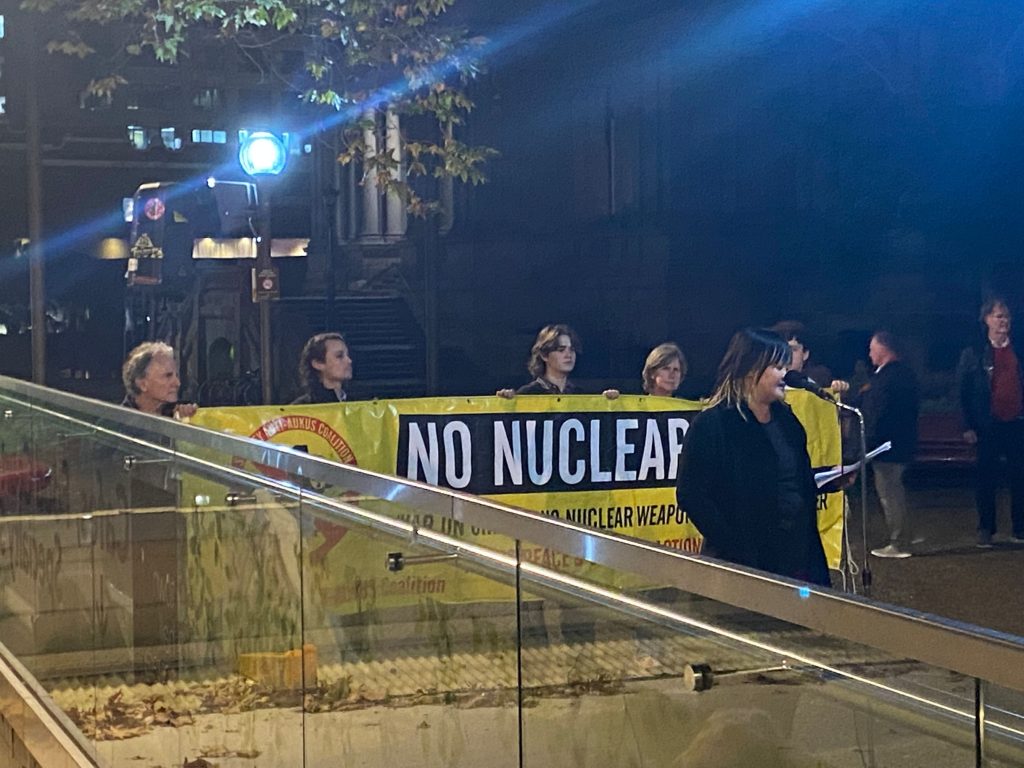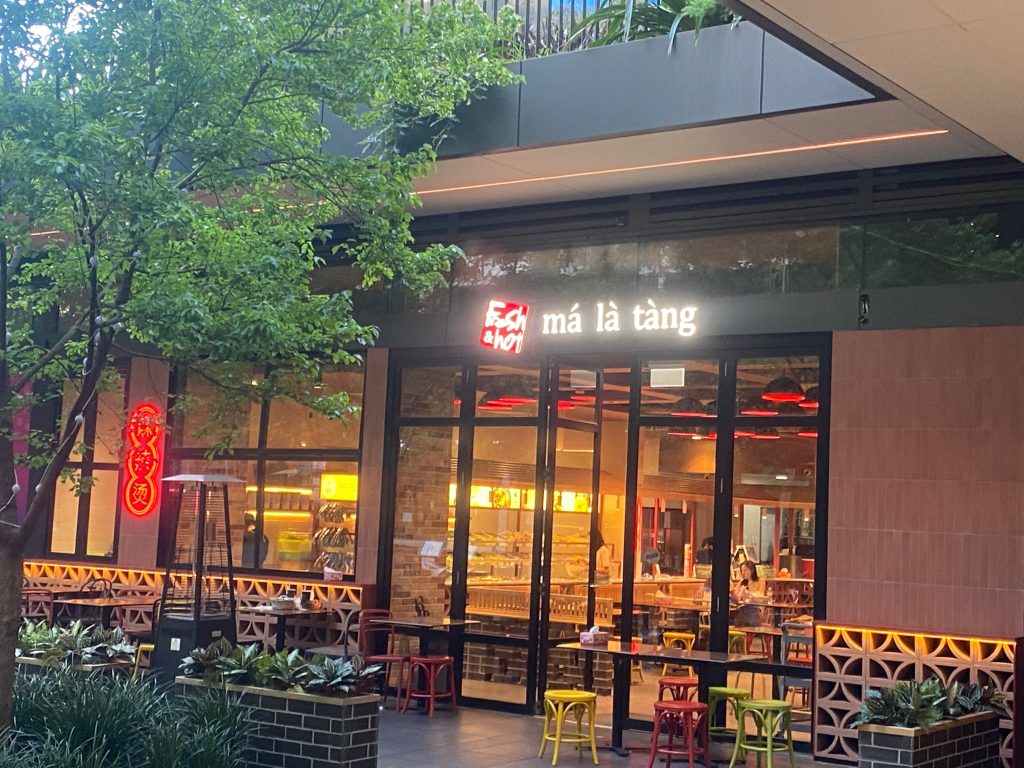
“Money for health and education, Not for war and devastation!“
May 24, 2023. A large crowd is gathering in Town Hall, Sydney, to protest against the AUKUS alliance and the militarisation of the Pacific, the building of nuclear-powered submarines and the increase of the military budget. It was organised by the Australian anti-AUKUS coalition, an anti-war organisation that sees AUKUS as an alliance likely leading to Australia’s involvement in a nuclear war with China.
This rally at Town Hall in Sydney is not the first time of protest over the AUKUS alliance. Earlier this year, The Australian Anti-AUKUS coalition cooperated with multiple political parties and organisations, from factions of the Greens and Labor party to global Non-government organisations like the International campaign against nukes to promote rallies against the AUKUS alliance’s deployments such as the Port Kembla nuclear submarine base.
What is AUKUS?
AUKUS coalition is a tripartite security pact between Australia, the United Kingdom and the United States. It was announced on September 2021 that the US and the UK would help Australia acquire nuclear submarines under the pact. China, on the other hand shows severe concerns over the treaty, calling it intensifying the arms race and undermining international non-proliferation efforts.
The treaty has been considered controversial in Australia. While the treaty was signed during Scott Morrison’s tenure in 2021, the opposition leader, now Premier Albanese, does not object to the project as long Australia does not need to build a nuclear industry or possess nuclear weapons. This attitude eventually considers implementing the current labour government’s commitment to the deal. On the other hand, a strong critique from former Labor prime minister Keating and David Shoebridge, Green Party’s spokesperson saw the deal as threatening the relationship between China and Australia, making Australia less safe.
20 years after Iraq, today in Parliament Labor proved they’ve learnt nothing from that disastrous war.
Labor stood up again &again to defend sinking $368+ Bn into a nuclear subs deal that handcuffs us to US war plans, leading us ever closer to another disastrous US-led invasion
— David Shoebridge (@DavidShoebridge) March 20, 2023
Why protest over AUKUS?
According to Professor Jake Lynch, who is an associate professor at the University of Sydney and a peace activist, The solution to the modern China-Australia relationship should be a position that is free from the paranoid visions of security agencies, which have constantly been influencing the Australian government’s decisions and shaping societal values to some extend. AUKUS, on the contrary, was a project that was never considered a considerate, diplomatic attitude with China and has dragged Australia into the United States’ agenda of a cold war with China.
“The justifications of AUKUS are not convincing, to begin with. “He states why he would support the rallies against the AUKUS treaty.
“It is wrapped as a deterrence treaty that follows the same logic that Australia spends billions of dollars to defend its trade with China and from China.” Said Lynch,” Its actual message was to show China that Australia can win a war with China, and the treaty’s de facto role is to make Australia attached to United States military presence and make sure Australia is on the road to war.”
As such, it would be necessary to protest AUKUS and to rally efforts to persuade the labour government to cancel it, and to raise awareness about its danger in dragging Australia into a future war with China, stated Lynch in a joint auditorium with Greens MP Jenny Leong in the University of Sydney, which tries to mobilise student activists in the University to attend the rally a week before the rally’s convened.

Anger from the budget
The other factors contributing to the rally may not strictly tie to the looming war presence with China and Australian imperialism. John Morris, a college teacher and NSW Teacher’s Federation member, attended the rally not only because the Aukus may lead to a more tense diplomatic relationship between China and Australia but a disappointment with the budget, but on behalf the Trade Union’s endorsement. The NSW Teacher’s Federation is one of the largest trade union that endorsed the coalition.
“As you can see, the budget has historically increased military spending this year. The government needs to care about funding for more important sectors of society facing difficulties. “Said John, who is carrying a petition to call for defunding the nuclear submarine at the protest scene. “The education sector was already seriously defunded in the previous administration, but the new administration did not pay enough attention to it in my opinion. Meanwhile, they have decided to expand the military even more!”
According to a report by the Guardian, the Australian Budget 2023 prioritised balancing the deficit of past accumulation. While considerable attention diverts to Medicare and poverty relief, education workers are disappointed. On the other hand, the budget for the military has reached 52.588 billion dollars, a historical record for the first time the defence budget has exceeded 50 billion dollars. A central reason for this expansion in the military is AUKUS’s planned cost of 386 billion dollars, which has driven Australian defence spending to a historical 2.5% of GDP in 2021.
“The struggle to defund Aukus is not only limited in the scope of talks of the ant-war movement, but it is also closely linked with other social movements marching for a more responsible government; I am disappointed that the current labour government will continue the spending on nuclear sub while not doing enough for us.” Said John.
The perspective of a community
“If a war happens, our community may face devastation”. Said Richard Fan, a Chinese -Australian student activist studying at Macquarie University, who came to support the protest.
The Chinese-Australian community is one of the largest migrant communities in Australia and one of the largest groups of Chinese diaspora across the globe. Furthermore, many Chinese come to Australia yearly for education, work and business opportunities. A looming conflict between China and Australia would harm the community in multiple ways.
“Should the relationship between China and Australia go sour, there will be encouraged racism against the tour community.:we might face violence, prejudice from representing in government, and discrimination in the workplace. “Said Fan. “I am working on getting attention from other Australian- Chinese community members and also Chinese International students in this joint effort to prevent the worse from happening. We have to combat the growing distrust in the society.”
Fan’s concerns were not exaggerated. During the covid-19, Anti-Chinese racism surged in Australia. The Chinese community is worried that the anti-Chinese rhetoric in politics would represent the Chinese people as a whole with the Chinese goverment and antagonise the Chinese in Australia.

How would the future play out?
In a survey by a Guardian, A pessimistic opinion on the observation of Aukus points out that the hawkish rhetoric propagating in Australian society today may be dangerous as there are no powerful anti-war movements to counteract this rhetoric, as manifested in the public apathy in the Aukus treaty. However, when asked about the future of the anti-auks movement, Professor Lynch’s repose is, “I would remain optimistic about the campaign to be successful in pressuring the government”. Fan and Morris also share a similar mood.
“We have a long road to go, but in the end, we might reach it”. Said Fan.





Be the first to comment